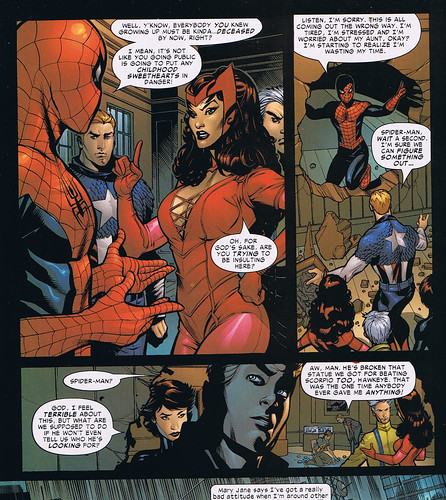
X-Men readers or just those who saw the first X-Men film may remember the Mutant Registration Act which Jean Grey and Professor Xavier oppose. The proposed legislation would require every mutant to be registered with the government. In July 2006, the Civil War storyling kicked off at a time when the Congress was pushing for the Superhuman Registration Act which would be even more encompassing than the Mutant Registration Act.
The story found the X-Men cast in the role of Congressional Democrats -- unable or unwilling to oppose the Patriot Act. They would, they insisted, take no position. Supposedly, this is because what might come instead could be even more destructive (the X-Men feel that way but, yes, some members of Congress also made statements along those lines).
Tony Stark's craven side was revealed more explicitly than usual. After a brief effort to oppose it, Tony was on board with it and making himself the spokesperson for all of super kind. (Consider him Katrina vanden Heuvel with less body odor.) Tony made himself the enforcer as well and he joined with other turncoats -- such as Mister Fantastic, Ms. Marvel and She-Hulk -- to dictate a party line.
Among those who (eventually) fights back? Captain America who ends up leading the rebel group which also includes Luke Cage, Sue Storm and Johnny Storm.
And as always the putz Spider-Man. Spider-Man's going to flee the country. Not because he opposed the principals of registration but because he fears knowledge of his identity will put Aunt Mae and Mary Jane in danger. They convince him not to worry and, no sooner do they stress that he can get some public recognition finally, Peter Parker's all on board.
This is one of the story's weaker points because the metaphors get mixed and Spider-Man's public revelation comes out less as a comment on the Patriot Act and more of a coming-out-of-the-closet moment, "My name is Peter Parker and I've been Spider-Man since I was fifteen years old."
But before Lady Gaga can sing "Born That Way," Spider-Man is a good little foot soldier in the move to destroy liberty and only reconsiders when he finds out about the prison and the fact that (this really hits home) the government's spying on him!!!! They've got trackers and other things in his suit. This leads Spider-Man to defect and then to publicly rebuke the Superhuman Registration Act.
Shouldn't Spider-Man have had an ethical position long before that? This is the man who refused to kill Carnage after Carnage destroyed NYC due to ethics but in the Civil War storyline, Spider-Man was incredibly vapid.
And dumb. That's really saying something for a man who already thought his parents had returned (they were robots) or was tricked by a Green Goblin-hired actress into thinking she was Aunt Mae or didn't realize Ben Parker was a clone. Time and again, Spider-Man has come off like a putz and a ditz. In the comic world, he makes Daphne Blake look like Brainiac.
And maybe for the Civil War storyline, the point was supposed to be that the universal person (Spider-Man) can end up on the wrong side but still find the strength to do the right thing? Possibly. More likely, when Marvel plots a story to involve all their major characters and need someone to act stupid, someone says, "Give it to Spider-Man, he's always doing stupid things."